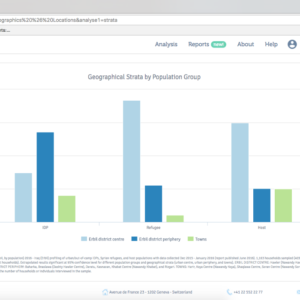 Obstacles to attending school, access to health facilities in different areas, challenges to return to places of origin – these are some of the aspects analysed in the urban profiling exercises in the Erbil, Duhok and Sulaymaniyah Governorates of the Kurdistan Region of Iraq (KRI).*
Obstacles to attending school, access to health facilities in different areas, challenges to return to places of origin – these are some of the aspects analysed in the urban profiling exercises in the Erbil, Duhok and Sulaymaniyah Governorates of the Kurdistan Region of Iraq (KRI).*
The DART now brings the data to you: the datasets behind the reports offer a rich source of information for further analysis and improved joint responses to displacement situations in the region.
You can access and explore the data from KRI, and learn more about how the data was collected. You can analyse the data by looking at the different population groups (refugees, IDPs and host communities) or by comparing geographic areas to each other. You can then interact further with the data in the DART to:
The profiling results provided an evidence-base used to improve targeting of cash-based interventions as well as urban planning projected by UN and NGO partners. It also led to a shared understanding of the urban dimension of displacement as well as its impact on the host communities.
For those interested in doing a deeper analysis of the data, the full datasets are available in Excel format on JIPS’ Humanitarian Data Exchange (HDX) page.
We would like to take this opportunity to thank the various partners to the profiling exercises for agreeing to share the displacement data from KRI with the wider profiling community. We at JIPS have been contacted many times by partners interested in further using the data for their own analysis.